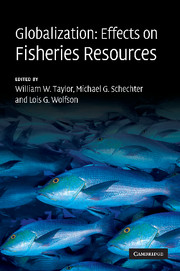Book contents
- Frontmatter
- Contents
- List of contributors
- About the editors
- Foreword
- Preface
- Acknowledgments
- Introduction: Globalization and fisheries: a necessarily interdisciplinary inquiry
- Part I Impacts of globalization on fisheries and aquatic habitats
- Part II Case studies of globalization and fisheries resources
- Part III Governance and multilevel management systems
- Part IV Ethical, economic, and policy implications
- Part V Conclusions and recommendations
- Index
- Plate section
Foreword
Published online by Cambridge University Press: 10 August 2009
- Frontmatter
- Contents
- List of contributors
- About the editors
- Foreword
- Preface
- Acknowledgments
- Introduction: Globalization and fisheries: a necessarily interdisciplinary inquiry
- Part I Impacts of globalization on fisheries and aquatic habitats
- Part II Case studies of globalization and fisheries resources
- Part III Governance and multilevel management systems
- Part IV Ethical, economic, and policy implications
- Part V Conclusions and recommendations
- Index
- Plate section
Summary
Globalization is an increasingly important driving force that connects various corners of the world. Although the phenomenon of globalization (worldwide economic, cultural, political, and technological linkages) is not new, the magnitude and speed of today's globalization are unprecedented. Since the latter part of the twentieth century, consumption of natural resources in distant locations has created an accelerating demand on local resources. The modern era of globalization has profoundly affected fisheries resources, one of the most important sources of protein for humans, in many ways. Numerous fisheries scientists, policy-makers, managers, producers, and consumers are deeply concerned about the impact of globalization on future fisheries from local to global levels.
This timely book fills an important void by including insightful and comprehensive papers from eminent scholars documenting the intricate relationships between globalization and fisheries. By elegantly integrating theory and case studies, this book offers a clear overview and detailed analyses of the socioeconomic and ecological consequences of globalization. The authors also critically analyze relevant governance and multilevel management systems, and provide fresh perspectives on ethical and socioeconomic dimensions of globalization in the context of fisheries management.
As the authors vividly illustrate, globalization is a double-edged sword. It threatens fisheries by reducing aquatic ecosystem productivity and diminishing fish stocks. Despite the use of more efficient technologies (e.g., vessels and fishing gear) to increase fish production, global capture fisheries have been decreasing rapidly in the past several decades.
- Type
- Chapter
- Information
- Globalization: Effects on Fisheries Resources , pp. xvii - xviiiPublisher: Cambridge University PressPrint publication year: 2007

